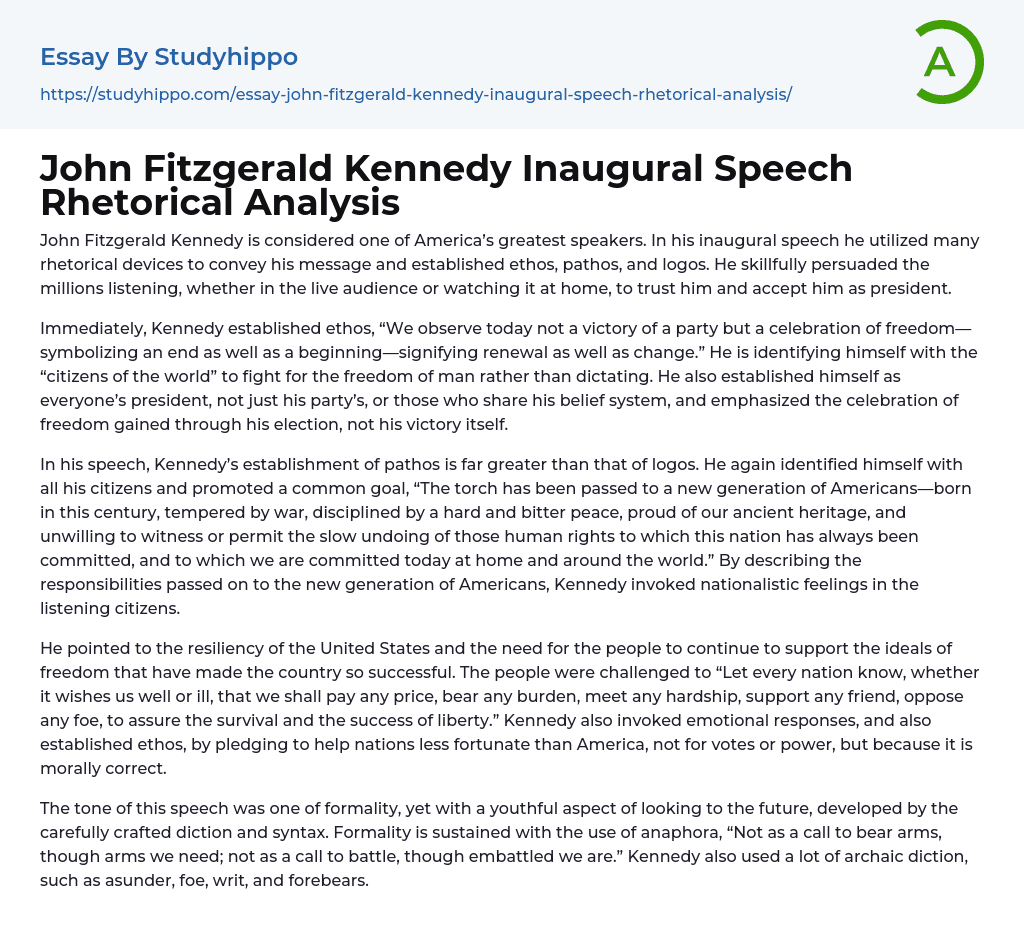

John Fitzgerald Kennedy Inaugural Speech Rhetorical Analysis Essay Example
John Fitzgerald Kennedy is widely considered one of the most adept public speakers in American history. In his inaugural address, he skillfully used different rhetorical techniques to convey his message and establish credibility, evoke emotions, and apply logical reasoning. With his impressive persuasion skills, he effectively convinced millions of people present at the event or watching from home to trust him and embrace his presidency.
To establish credibility, Kennedy uses ethos by stating, "We observe today not a victory of a party but a celebration of freedom—symbolizing an end as well as a beginning—signifying renewal as well as change." By aligning himself with the "citizens of the world," Kennedy shows his commitment to fighting for the freedom of all people, rather than imposing his own beliefs. Additionally, he positions himself as a president fo
...r everyone, surpassing party lines and ideological divisions. Instead of focusing only on his personal triumph, Kennedy highlights the significance of commemorating the freedom achieved through his election.
Kennedy's use of pathos in his speech surpasses his use of logos. He once again connected with all his citizens and advocated for a shared objective, stating, "The torch has been passed to a new generation of Americans—born in this century, tempered by war, disciplined by a hard and bitter peace, proud of our ancient heritage, and unwilling to witness or permit the slow undoing of those human rights to which this nation has always been committed, and to which we are committed today at home and around the world." By depicting the responsibilities bestowed upon the new generation of Americans, Kennedy aroused nationalistic sentiments among the attentive audience.
View entire sample
justify">The speaker highlighted the United States' strength and emphasized supporting freedom, which has contributed to its success. He urged people to show their commitment to protecting liberty by stating, "We are prepared to make sacrifices and face challenges in order to preserve and promote freedom, regardless of other countries' stance." Furthermore, Kennedy used emotional appeal and gained trust by promising assistance to less privileged nations out of a moral obligation rather than personal gain or power.
The speech had both a formal tone and a youthful aspect that looked towards the future. This tone was achieved through the careful selection of words and sentence structure. The use of anaphora, such as "Not as a call to bear arms, though arms we need; not as a call to battle, though embattled we are," helped maintain the formal atmosphere. Furthermore, Kennedy included archaic language in his speech, utilizing words like asunder, foe, writ, and forebears.
- Acceptance essays
- Age Of Enlightenment essays
- Child Observation essays
- Confucianism essays
- Conscience essays
- Critical Reflection essays
- Destiny essays
- Determinism essays
- Empiricism essays
- Environmentalism essays
- Epistemology essays
- Ethics essays
- Ethos essays
- Existence essays
- Existentialism essays
- Fate essays
- Free Will essays
- Functionalism essays
- Future essays
- Good And Evil essays
- Human Nature essays
- Individualism essays
- Meaning Of Life essays
- Metaphysics essays
- Natural Law essays
- Personal Philosophy essays
- Philosophers essays
- Philosophy Of Life essays
- Political Philosophy essays
- Pragmatism essays
- Reality essays
- Relativism essays
- Teaching Philosophy essays
- Time essays
- Transcendentalism essays
- Truth essays
- Utilitarianism essays
- Abraham Lincoln essays
- Andrew Jackson essays
- Barack Obama essays
- Bill Clinton essays
- Donald Trump essays
- Franklin D. Roosevelt essays
- George W. Bush essays
- George Washington essays
- James Madison essays
- John F. Kennedy essays
- Lyndon B. Johnson essays
- Richard Nixon essays
- Theodore Roosevelt essays



